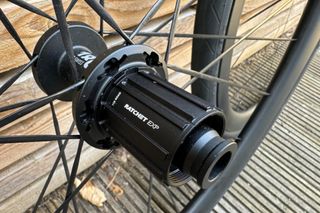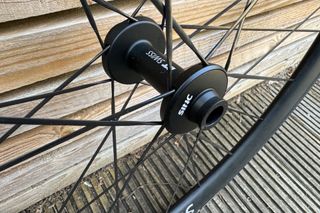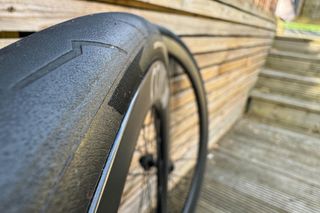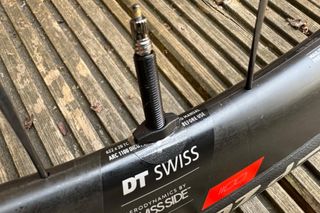DT Swiss was began 30 years in the past in 1994 in Biel, Switzerland. In its personal phrases, it “meticulously develop high-performance biking elements that present a aggressive edge to each formidable bicycle owner.”
Its wheels, like these ARC 1100 Dicut DB 38s, may be seen on the bikes of the UNO-X biking groups, whereas their hubs have lengthy been utilized by wheel builders. It additionally created the star ratchet freehub system, which for the reason that patent ran out the expertise has been adopted by many different of the most effective street bike wheels.
The development
The DT Swiss ARC 1100 Dicut DB 38 are DT Swiss’s high quality line of wheels. The primary distinction between the 1100 and the cheaper 1400 are the hubs. Whereas the 1400 makes use of DT Swiss 240 hubs with commonplace bearings, the 1100 makes use of the Dicut 180 hubs with SINC Ceramic bearings. DT Swiss declare these are superior ceramic bearings to opponents because of tolerances or inside a number of thousandths of a millimetre with the hubs they’re made with. The thought is improved sturdiness and lowered friction.
The 180 hubs are additionally lighter than the 240. The hubs use Ratchet EXP 36, which has a ten diploma angle of engagement, so to interact the freehub it’s good to pedal at most 10 levels. That is designed with a single spring to permit the freehub to show or have interaction, serving to scale back the variety of shifting elements, enhancing sturdiness in addition to repairability. The ratchet additionally has an enormous engagement contact level, lowering any likelihood of slip and lowering put on on particular elements.
One factor I did discover nonetheless was that when spinning the wheel in a stand to get sealant unfold over the within, the cranks spin when the wheel is spinning rapidly. This may be a problem with bigger contact factors and extra enamel for engagement – primarily the freehub is extra draggy. That is solely a problem when coasting, and the entrance wheel spins like a dream with the SINC bearings.

(Picture credit score: Future)
The edges are carbon and hooked to be used with tubeless tyres with an inside width of 20mm and exterior of 26mm, making them a little bit on the slim aspect by a number of the more moderen tremendous broad tyres with 21-23mm inside widths and 28-30mm exterior.
DT Swiss use its AERO+ strategy with these wheels, designed along side aero consultants Swiss Facet, which incorporates efficiency as an entire package deal. There may be translational drag, the wind hitting the wheel immediately in addition to the crusing impact from wind coming at wider yaw angles. There may be rotational drag trying on the spokes and the impact they’ve, whereas Steering Second is taken into account to optimise the wheel efficiency in cross winds. Lastly rolling resistance, with the 20mm inside width with a 28mm tyre producing a smaller contact patch than narrower wheels and tyres whereas sustaining grip.

(Picture credit score: Future)
The wheel additionally comes outfitted with DT aerolite® II t-head spokes for the entrance wheel, additionally for the rear wheel on the non-drive aspect. DT aero comp® II t-head are used on the rear drive-side. 24 are used entrance and rear in a 2-cross 1:1 lacing sample. That is to optimise stiffness each when it comes to maintaining the wheel universally spherical, but in addition sustaining torsional stiffness when braking, accelerating or cornering.
All this places the wheels at 1348g on our scales, barely above the 1299g claimed weight. Nonetheless disc rotor lockrings and tubeless tape had been put in once we weighed, which accounts for the additional grams.
The trip
The primary a part of any wheel overview is becoming the tyres. I’ve been utilizing the Pirelli PZero RS Race TLR 28mm tyres throughout a variety of wheels, and I’ve to say the DT Swiss had been one of many more durable rims to get the tyres put in onto, however not the worst by a way. Getting them seated was very straightforward although, with valve cores nonetheless in and simply utilizing a observe pump they seated properly.
Nonetheless I did have points with air seeping out so the wheels tended to sit down at 70 psi as seepage stopped. The valve holders usually are not rubber sealed so even with a number of rim protector plastic rings, it was tough to get a full seal even when including extra sealant and checking the rim tape. Typically it settled at 70 psi, nonetheless having added one other load of sealant, it appears to be holding higher, however nonetheless not constantly.
Spinning the wheels within the body additionally did present they had been universally spherical and had no lateral oscillation, one thing that I’ve present in some mid-high finish wheelsets nonetheless.

(Picture credit score: Future)
Driving the wheels they had been immediately very completely happy to speed up on top of things properly. This was most noticeable from sluggish speeds the place they picked up pace rapidly, however was additionally good at greater speeds as nicely. When travelling 45-50kph I used to be nonetheless capable of get the pace up properly when sprinting, usually one thing that isn’t as robust a degree for shallower wheels. The stiffness of the wheels probably helped with these accelerations together with the low rotational weight. This stiffness additionally helped with cornering confidence because the wheels felt planted and really in management when taking quick or technical corners. The spoke lacing sample and quantity probably helps out right here, as typically within the pursuit of aero beneficial properties spoke rely is lowered, which negatively impacts cornering and torsional stiffness in my expertise.

(Picture credit score: Future)
By way of aero efficiency I can’t say precisely how they fare towards different wheelsets. I’ve been testing a number of deep part wheels just lately, 50-60mm, and when it comes to flat efficiency the DT Swiss 38 is a wheel of two halves. In headwinds with low yaw, they do really feel very quick, and I might say similar to a deeper part wheel. Nonetheless in crosswinds they’re steady however don’t really feel as quick, probably because of the lowered sail impact of a shallower wheel in crosswinds. Common speeds usually are not essentially the most correct approach to gauge issues, however typically these have been slower than a deeper part wheelset over routes with 80-120m/10km of elevation. Nonetheless, I’ve at all times felt that shallower wheels really feel extra enjoyable and full of life to trip due to this, and the DT Swiss definitely do. The excessive stiffness and low weight do make these very good for climbs, but in addition throwing round a bit and quick dealing with. If I used to be racing, even on hillier terrain, I might use a 50-60mm wheelset. Nonetheless for day after day driving and maximising enjoyable, these wheels are very good.
Worth & conclusion
At $2,999.80 / £2,499.98 these are an costly set of wheels and place them firmly within the greater finish spectrum of wheelsets. Weight and depth are much like the Zipp 353 NSW, however these are $4,422 / £3376. The Hunt 32 Aerodynamicist UD wheelset is available in at $1,829 / £1499 and 1213g claimed weight, however lacks ceramic bearings and the lowered spoke rely might influence general stiffness based mostly on private expertise. The ENVE SES 3.4 wheelset is one other equally spec wheelset however is $2,850 / £3350.
When wheels with comparable weight, stiffness, and aero specs, the DT Swiss truly comes out fairly nicely towards the competitors. There are cheaper choices accessible that current higher general worth, however higher general efficiency is questionable.
The DT Swiss ARC 1100 DICUT 38 DB wheelset is a extremely enjoyable set of wheels to make use of. The low weight mixed with the sensible stiffness makes them tremendous responsive to each little bit of stress that you simply put by the pedals. Add to that nice dealing with, stability, and a quick wheelset that’s respectable when in comparison with deeper opponents and it actually is a good general package deal. It’s not as ‘quick’ as a deeper wheelset over most programs, however it’s subjectively extra enjoyable. Nonetheless, with some tyres it seems to wrestle to carry above 70 psi and at $2,999.80 / £2499.98 they’re very costly.

